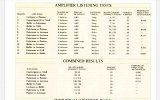I took your question to mean whether the reviews in question could be trusted to show results that supported your claims. (They do not.) Instead, you were asking whether the reviews in question were scientifically reliable, which they were.
THERE IS NO "MORAL SUPERIORITY" TO THIS MATTER. You have provided anecdotes of differences between amps. Amplifiers that are competently designed are not "punchier", nor do they have "character" or "warmth". These differences were not supported by logic or scientific comparisons. They were, at a minimum, the result of human bias and fallibility. The conclusion is that the differences you purport to hear did not exist, yet you offer them as if they had value.
You say you are trying to help others. These anecdotes are not helpful because thy are not supported by controlled comparisons. That is why they are "worthless" and "misleading". If you want to help others, provide information that is based on science, and is able to be replicated.
"Passion" (another word for "emotion") is not a reason to make statements unsupported by logic or science, nor does "point of view" validate such statements. This site supports clear and logical thinking, not emotion.
No one is censoring you. No member can do that. Only the moderators can do that. You are simply being provided with insight into your mistakes. Please abandon reliance on subjective opinion, and read the links I provided for you regarding 1) cognitive bias, 2) the correct way to determine differences through blind testing, and 3) the ease with which the human brain can be fooled.
In addition to those links, there are more in the Audio Reference Library on this site.
Jim
So, Jim, I like your input on this and coming from an engineering background, I've probably posted many missives just like this in various photography forums - in photography, there area lot of folks also looking for the 'character' of a lens, for example, when in reality the best-measuring, most technically perfect lens adds no 'character' and just delivers the light wavelengths and intensity exactly as received directly to the sensor.
Adding 'character' simply means adding optical distortions.
Here's where I've landed, though - there are rare times when the expression of a subjective preference is
simply describing an attribute that hasn't had an objective framework built around it yet.
I can give you examples in several areas of this, but what springs to mind regarding the photography analogy is
bokeh - there is absolutely no objective way to measure the quality or appeal of bokeh. Believe me, many have tried, some very smart folks have tried and failed with sometimes ridiculous results. Bokeh is tied to the number of aperture blades, but not just that - very many attributes of various aspherical elements in combination with each other affect this, and tweaking a lens for a chromatic aberration for example can fix the CA but make the bokeh seem un-appealing.
So, I have no doubt that it's possible to define and measure this attribute - build a computer model that takes the lens elements in the design, the number pf aperture blades, maximum aperture of the lens and rate it's subjective bokeh appeal at every aperture - but even with decades of computer-modeled, aspherical lens designs bringing incredible optical capability on demand - no manufacturer can magically adjust a rheostat to make bokeh prettier. Yet.
Now, one advantage with photography is you can show bokeh in forums, which you can't do with the audio experience in any real way. With audio subjectivity (from a trusted source who's opinions have matched yours in the past) is still valuable and necessary if used with whatever objective data is available, if any.



